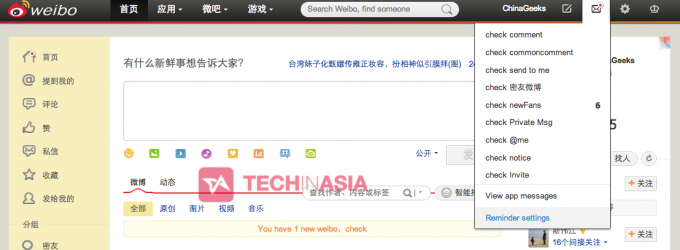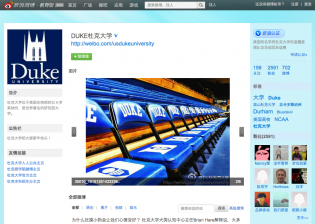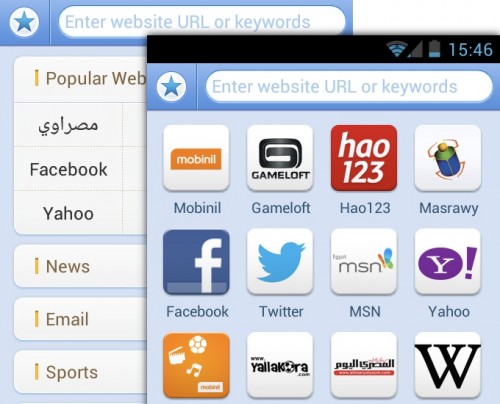We Are Social Asia Tuesday TuneUp #61
China’s WeChat app gets flak for censoring messages globally
Tencent WeChat’s international foray may have just hit a stumbling block in what previously seemed to be a virtually unhindered path of expansion. Some users reported being unable to send messages containing sensitive terms even when doing so outside of China. A screenshot below shows an error notification stating that the message contained restricted words. These incidents raised privacy concerns that even international users are being subjected to the same censorship regulations and monitoring as Chinese users. Tencent has since apologized and clarified that the inability to send certain messages were due to a technical glitch which have been rectified.
Duke University recruits students using Sina Weibo
Last week, Brad Pitt’s Sina Weibo account created ripples of excitement amongst Chinese netizens. It seems Sina Weibo has been selected as the social media platform of choice amongst international celebrities, politicians and organizations seeking to reach out to Chinese speaking Internet users. Duke University’s Pratt School of Engineering recently hosted a group chat on their Sina Weibo page to respond to queries from prospective students about its graduate program. Within an hour, the group chat fielded 80 questions from 150 participants. Graduates and current students on the program were also online to answer questions. Duke also has an active presence on Renren, China’s answer to Facebook, as part of what seems to be a rather aggressive social media strategy to reach out to the Chinese speaking market.
Sina Weibo rolls out partial English Language interface
Finally, Sina Weibo rolls out a partial English-language user interface on the web, long after they launched the English version of Weibo’s iPhone app in April 2011. Targeted at users in Southeast Asia, it seems many users encountered problems with using it and the English translation disappears as they navigate through the site.

The above screenshot shows the partial English interface on the web whilst the screenshot below shows the English interface on the iPhone app. There seems to be a vast disparity between the quality of the translation on both platforms. The dismal translation on the web interface could indicate that the product may not be ready for launch yet especially since Sina has not made any announcement of the new rollout.
Baidu teams up with Orange to reach out to North Africa & the Middle East
Chinese search engine Baidu launches El Browzer, an Android web browser to North Africa and the Middle East as part of its international expansion plans. Having tied up with mobile telco Orange for this latest venture, the app will be pre-installed or available for download on all Orange Android devices within Africa and the Middle East (AMEA). Available in Arabic, English and French, the launch of this app and the collaboration with Orange is significant as the telco has about 80 million customers in AMEA. It will be interesting to see what the year ahead holds as Baidu has identified Southeast Asia, the Middle East and North Africa, as well as Latin America as their chief target areas for expansion.
Social media harassment now more common in Japanese workplace
Japanese social media users seem to be experiencing a new form of stress and harassment in the workplace in the form of being pressured to accept friend requests from superiors or even being compelled to “Like” or “Comment” on their posts. It seems more people are turning to Japan Online Counseling Association for advice on how to deal with friend requests from co-workers and superiors on social networks such as Facebook. Employees reported feeling pressured to accept these friend requests to avoid tense relations at work. A survey conducted by Macromill, Inc last February of 500 Facebook users found that 42% were bothered by friend requests. Whilst it is likely that the intent of the supervisors is to get to know their juniors better, an expert has advised users in such situations to separate work from personal life.
Following the money trail in digital marketing
An article by Gartner has discussed how most brands intend to increase their social media marketing budgets in 2013, whilst going into further detail about the money trail and how companies can reallocate budgets from other areas, advising employing clearer measurements of success and tracking of the sources of funding. A breakdown is included of brands’ intentions for digital marketing.

Digital set to account for a fifth of advertising spend
Another study, this time by eMarketer, has also shown the extent to which brands intend to increase their digital spending. Worldwide digital spend, which has already passed the $100 billion landmark, is set to grow by 15.1% to $118.4 billion by the end of 2013. This growth will then remain in double figures as far as 2015, as shown by the graph below:

Organic Facebook impressions increase brand website visits by 76%
Ignite have conducted research into groups of people who view both organic and paid impressions on Facebook, compared with a control group who did not. They found that those who were shown organic exposure were 76% more likely to visit a brand website than those receiving no impressions, whilst paid exposure increased the same likelihood by 28%.
Fortune 500 and FTSE 250 companies catching up with social media
Fortune 500 companies are starting to warm to social media, a study by the Charlton College of Business has shown. These firms had traditionally lagged in the area and as late as 2011, 31% of Fortune 500 companies were without both a Facebook and Twitter page. This figure has dropped by 8% to 23% for the end of 2012. 62% also have their own YouTube account. In the UK, 40% of FTSE 250 companies have a corporate social media presence, representing an increase of almost three times, from 14% over the last year.
Regional Facebook fan breakdown shows up bought likes
Since Facebook have recently allowed users to view a breakdown of a brand’s fans by area, Socialbakers have produced research that highlights some curious data. Some brands have seemingly inexplicable high fan counts in certain countries, such as a fifth of Lufthansa fans coming from Indonesia & Pakistan, despite the airline serving neither of the countries. This information, whilst not conclusive, suggests likes may have been purchased. Also of interest from the study is an understanding that global fan counts do not always represent accurate marketing opportunities. For example, PlayStation outrank Xbox in terms of global fans, but Xbox triumph in all English-speaking countries.
More teens on Tumblr than Facebook
Research of 1,038 Internet users by Garry Tan shows the numbers of both 13-18 and 19-25 year olds on different social networks. Interestingly, the younger age group are more active in every single category, suggesting that thoughts about the potential demise of Facebook et al are premature. In fact, 55% of the former group were on Facebook, compared to 52% of the latter. Perhaps the study’s biggest finding is that Tumblr was used more by both age groups.

The social landscape is increasingly mobile
It is no secret that more and more people are using mobile devices to access social networking sites. In fact, research by Nielsen has shown that the market is continuing to grow, with 46% of US social media users in 2012 accessing the sites via mobile, compared to 37% in 2011. Whilst computers remain the overwhelmingly popular choice, with 94%, this is a drop of 3% from the previous year.

Furthermore, a Google survey showed that 60% of US smartphone owners use their devices to access social networking sites daily, compared to 16% who never do so. This is in comparison to 54% and 17% for the same figures in 2011.

Facebook loses 600,000 UK users in December
The Guardian have reported Socialbakers research that Facebook lost 600,000 UK users in December, raising the question of whether it is reaching saturation point in the market. Whilst social networks expect to see a slump in activity over the festive period, it will be interesting to see if this larger-than-average dip is a result of a long term effect, or just a more severe version of the aforementioned Christmas slow down. In fact, Socialbakers responded to the Guardian to clarify that Facebook is operating at nearly full penetration in the UK and that the slump in figures may be as a result of Facebook’s measurement tools. They measure monthly active users, which means that if people are not active over the last month, they will not appear. We may well expect the figure to shoot up again in January.
A message to Mark Zuckerberg? That’ll be $100, please…
Facebook’s never-ending search for new revenue streams continues, with the social network now offering users the chance to message Mark Zuckerberg for $100. Normally, messages from those who are not his fans will be directed straight into his ‘Other’ folder; the charge ensures that they go straight to his inbox. The system is a version of Facebook’s interest in potentially charging for messaging, which we previously reported and it will be interesting to see if these trials are rolled out further. We would message Zuckerberg and ask, but the fee seems a bit steep…

Instagram loses half active users in one month?
The Wall have reported that Instagram lost half of its active users in the last month, as a result of changes to its terms of service. The figures, which come from App traffic monitoring firm AppStats, seem to suggest that Instagram went from 40 million to 17 million users, which does seem incredibly steep. It may be the case that the numbers end up rising again quite quickly.

How to engage amplifiers
Twitter have produced an article on amplifiers, the people most likely to retweet your content. Their first point is that amplifiers don’t fit into one neat demographic but, having said that, there are a number of ways to recognise them. Firstly, they are heavy Twitter users and more likely to use Twitter on a mobile phone than others, with 54% of them doing so. They also engage in a wide range of activities on the microblogging platform, as shown by the below graph:

They are also much more likely to follow brands on Twitter, with amplifiers more than twice as likely as the average Twitter user to follow over 20 brands. Finally, they are big fans of television, so recognising the important of dual screening should be important to anyone looking for retweets.
Who are LinkedIn’s 200 million members?
LinkedIn have reached 200 million members around the world. The most active country on the network is the USA, with 74 million members, followed by India with 18 million. The fastest growth is going on in Turkey, Colombia and Indonesia, whilst China, Brazil and Portugal are displaying the highest mobile growth. If LinkedIn were a country, it would have the 5th largest population in the world, larger than Brazil and equivalent to roughly France, the UK and Italy combined.
Google+ Pages can interact with users who haven’t circled them
Having launched pages for businesses in November 2011, Google+ are now allowing these brands to communicate with all users of the network, as opposed to simply those who have circled them. The move seems to be aimed at encouraging brands to join Google+ and should allow more strategic methods of fan base growth.
Western Interest in Sina Weibo increasing
Sina Weibo’s launch of the partial English language interface on the web is timely, as Western celebrities and brands are looking to get involved with Sina Weibo. Brad Pitt, who does not currently even have a Twitter account, is the latest celebrity to join a cohort that includes Justin Bieber and Radiohead, whilst brands like Coca-Cola, Unilever and Louis Vuitton are all on board. As We Are Social’s Jon Hoel told the Telegraph:
If you want to be big in China then you have to be on Sina Weibo. Every major western company knows that it is the place to be right now if they want to build their brands overseas.
The Premier League on Twitter
Twitter have released a list of the most popular English Premier League football clubs on Twitter. Their study takes into account a number of metrics, from number of followers to innovative uses of the network and involves fans and players as well as official club accounts, looking for an overall, rounded measure of success. Manchester City will be delighted to welcome a new addition to their trophy cabinet, whilst Stoke, Swansea and Wigan are currently in the drop zone as the three worst-performing clubs. This interactive map shows the breakdown of supporters of different clubs all over the country and can be sorted by club or rivalry. Below you can see how Arsenal and Tottenham fans are spread across the UK.

The Associated Press to feature sponsored Tweets
News source the Associated Press are set to promote Tweets on their feed, which has caused anger amongst some followers and other journalists. These are not official promoted tweets, rather just branded content that they will post on their feed from time to time, with Samsung announced as their first partner. The negative reaction comes as a result of people arguing that this will somehow compromise the neutrality of their reporting, whilst others have jumped to their defence to claim that it will make no difference, even praising the organisation for their openness and honesty.
Lenovo’s ‘Year of the Do’
Lenovo and We Are Social have together released a campaign called ‘Year of the Do’, based around the PC company’s ‘For Those Who Do’ slogan. The Facebook app, based on the insight that sharing your resolutions can help in keeping them, allows users to share their New Year’s resolutions, which can then be seen and interacted with by friends and users around the world. We Are Social’s US managing director Leila Thabet said:
[The campaign is] about inspiring people to do and achieve their best and tapping into that…it’s about facilitating the do.
Monopoly’s ‘Save your Token’
Monopoly are looking to refresh the game with a social campaign that sees users required to vote and save their favourite token using a Facebook app. One of the eight classic tokens (i.e. board pieces – car, thimble, boot, dog, battleship, hat, iron, wheelbarrow) is to be replaced by a new one (robot, diamond ring, cat, helicopter, guitar) based on the number of votes cast. Would you give the boot the boot? Or perhaps it’s time for the battleship to walk the plank? Maybe the thimble should… oh, you get the picture.
Evian create cross platform campaign about ‘Living Young’ in January
To counteract the normal January blues, We Are Social have produced an integrated campaign for Evian that encourages fans to ‘Live Young’ in January. The activity is based around a social hub on Facebook that provides 31 different ways to enjoy yourself, ranging from a ‘Rock Paper Scissors’ game to a competition to win a trip to see the Northern Lights. In its first week alone, the campaign has boosted Evian’s fan count by 21,000.
UK ad regulator getting involved on Facebook & Twitter
Ad watchdog the ASA have banned a set of Tweets and Facebook posts from different brands. Firstly, they got rid of the below Keith Chegwin tweet for not stating it was an advertisement:

Then on Facebook, Antica Sambuca got in trouble for using “irresponsible” images in their updates. These included pictures of young people with multiple drinks, implications that people were set to drive and looked as though their subjects were intoxicated. This should come as no surprise, as since March 2011 it has been under the ASA’s jurisdiction to regulate social media and both examples clearly break the CAP Code. Brands would be best advised to follow the joint IAB and ISBA social media guidelines.


